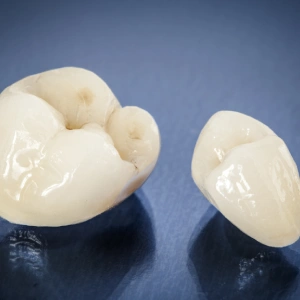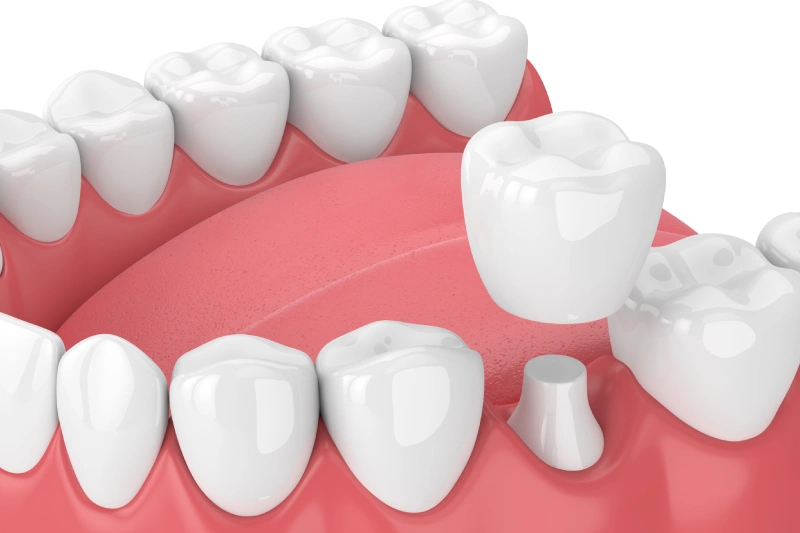Is it Painful to Get a Crown?” This question often weighs heavily on the minds of those considering dental crown procedures. The anticipation of discomfort can be a significant source of anxiety for patients seeking to restore their oral health and enhance their smiles. However, the process becomes less daunting when one understands pain management and hears about others’ experiences.
In this discussion, we explore the intricacies of dental crown treatments, providing insights into pain perception and strategies for a more comfortable dental experience.
Understanding Dental Crowns
Think of a dental crown as a custom-made shield for a tooth that needs extra support. It’s designed to fit snugly over a tooth that’s weakened or damaged, restoring its strength, shape, and brightness. Whether your tooth has been treated, fractured, or needs a cosmetic boost, a crown can refresh its look and function, giving you a reason to smile brightly.

When is a Crown Needed?
Crowns become necessary under several circumstances:
Strengthening Weakened Teeth:
Crowns provide strength to teeth with significant decay or fractures. A crown is often the recommended solution when a tooth cannot support a filling. A crown is typically placed after a root canal procedure to restore the tooth’s ability to chew properly.
Supporting Dental Implants and Bridges:
Dental Crowns are used to cover dental implants or support bridges to replace missing teeth.
Enhancing Tooth Appearance:
In some instances, crowns are employed to improve the appearance of a tooth.
Eligibility for Dental Crowns
When a tooth sustains significant damage from injury or decay while the root remains intact, a dental crown can effectively restore its beauty and function. Patients with good overall oral health and hygiene are typically suitable candidates for dental crown placement. However, if the tooth is lost or requires extraction, or if the surrounding decay is extensive, alternative options like dental implants, bridges, or dentures may be more appropriate for long-term restoration.
The Crown Placement Procedure
The Crown Placement Procedure involves a series of steps to fit a dental crown over a tooth:
- Preparation: The dentist carefully readies the tooth, addressing any issues like decay or damage.
- Impression: A precise impression of the tooth is taken to create a crown that fits perfectly.
- Temporary Crown: While the permanent crown is in the making, a temporary crown is fitted to protect the tooth.
- Final Placement: During the next visit, the temporary crown is replaced with the custom-made permanent crown, ensuring proper fit and alignment.
Does Crown Placement Hurt?
We understand that the idea of dental procedures, including dental crowns, can be unsettling, especially when it comes to pain. Sensitivity during shaping is normal, but our caring dentist will use anesthesia to ensure your comfort. Your well-being is our priority, and we’re here to support you.
During the second visit, some patients may feel slight pressure when the permanent crown is placed, but it’s generally painless. Any discomfort afterward is usually mild and can be managed with over-the-counter pain relievers.
Post-Crown Care
After getting a dental crown, it’s important to take care of it to ensure its longevity and your oral health. Here are some tips for post-crown care:
- Brush your teeth twice a day and floss daily to maintain good oral hygiene.
- Don’t chew hard or sticky foods that can damage the crown.
- Visit your dentist timely for check-ups and professional cleanings.
- If you experience any discomfort or notice changes in your crown, contact your dentist promptly.
- Follow the instructions given by the dentist for caring for your crown.
Conclusion
Is it painful to get a crown? This question often causes concern for many considering dental procedures. However, the process is typically manageable and minimally uncomfortable with modern techniques and anesthesia. Understanding the procedure and communicating with your dentist can alleviate fears and ensure a more comfortable experience.
Ready to address your dental needs without fear? Contact Abadin Dental in Coral Gables, FL, for a consultation. New patients can call at (305) 783-3750, while all other callers can reach us at (305) 446-1584. Book your appointment and take the first step towards a healthier smile today!
FAQ
Is getting a dental crown painful?
With the use of local anesthesia, most patients experience minimal discomfort during the crown placement procedure.
How long does it take to get a dental crown?
The process typically requires two visits to the dentist, with the first visit for tooth preparation and impressions and the second for crown placement.
What can I expect after getting a dental crown?
Following the procedure, you may experience mild sensitivity or discomfort, which can usually be managed with over-the-counter pain relievers.
Are there any risks associated with getting a dental crown?
While rare, potential risks include allergic reactions to materials used in the crown and complications such as infection or damage to the tooth or surrounding structures.
How long do dental crowns last?
Dental crowns can last between 5 to 15 years or even longer with proper care and maintenance.


